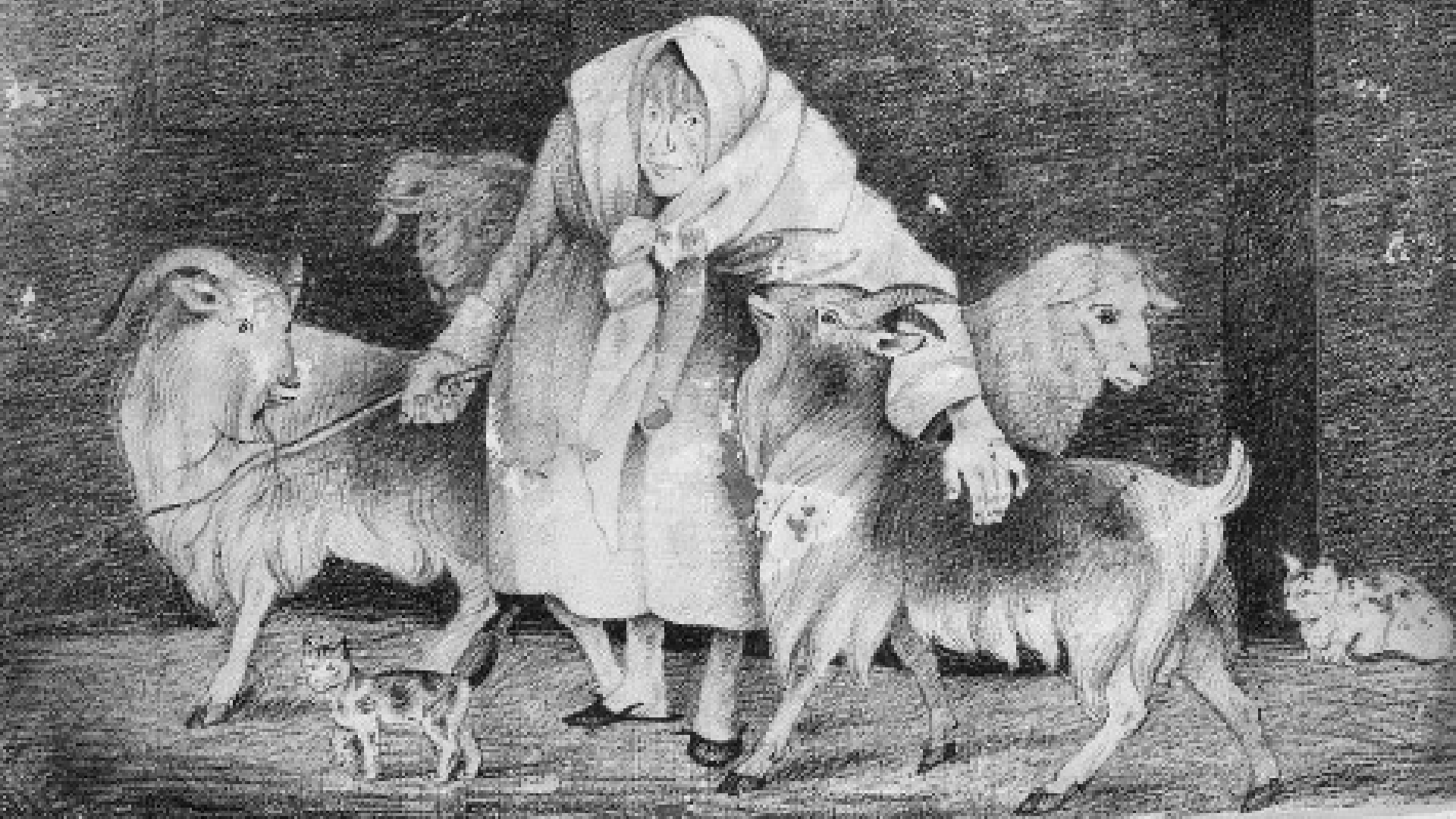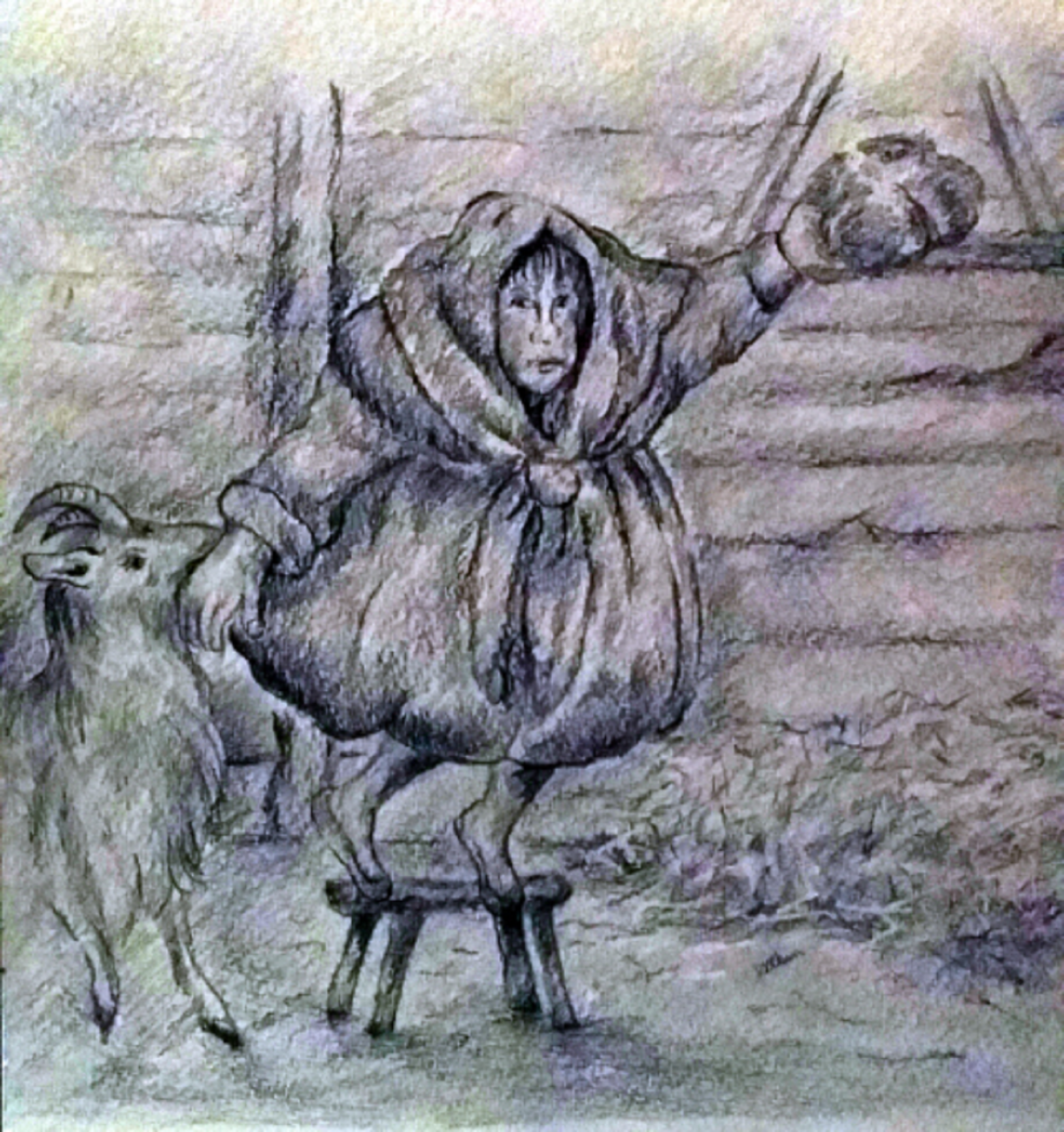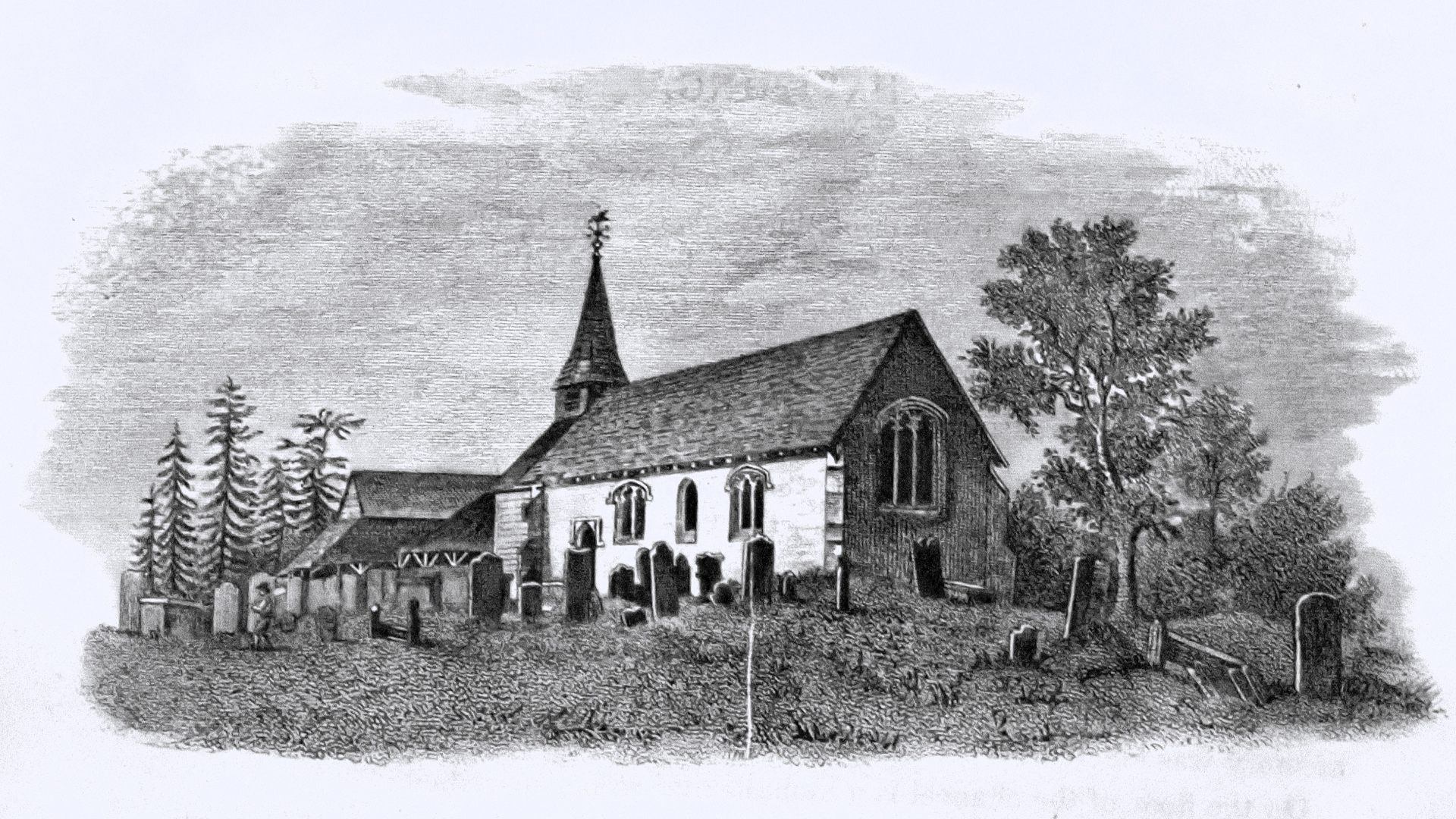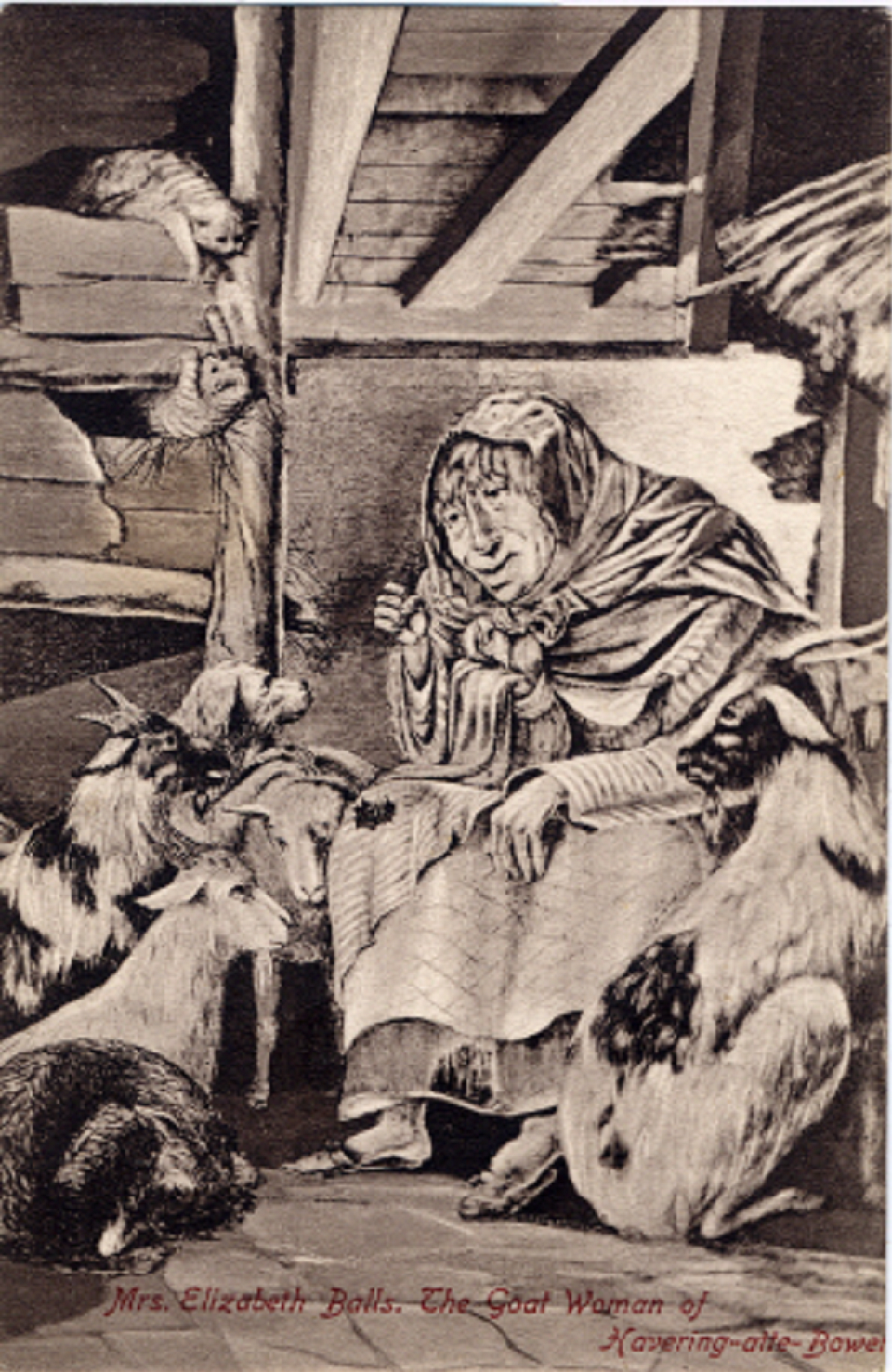HISTORY OF HAVERING
Elizabeth Balls (1761 - 1824)
The Goat Woman
Miss Elizabeth Balls, the mild-mannered daughter of a respectable farmer, was born in Hemel Hempsted during 1761. She moved to a thatched cottage at Havering-atte-Bower near the Green; living on the ground floor with up to fifty goats, two sheep, seventeen chickens, two or three cats and a dog. Considered a lady of liberal education and superior mind, Elizabeth, commonly known as "Betty", or "The Goat Woman", was talked about for miles around.

It is claimed that Elizabeth started living in seclusion after the death of a lover lost at sea. He had given her a favourite she-goat, and to this animal she transferred all her affections after he was gone. Its progeny increased and these formed her family, If any of the animals fell sick she attended them with the anxious solicitude of a parent. Elizabeth referred to her goats as her "Dear children". Elizabeth's skin turned yellowish-brown from filth and smoke in her dwelling. She lived mainly on milk produced by the goats. Nobody was ever allowed to enter the cottage except roughly twice a year when a person would come to clear out the accumulated mess made by the animals.
There were four rooms, two on the ground floor, and two upstairs. Upstairs became unsafe due to neglect so could never be used. On the ground floor one room was filled with firewood where poultry roosted, the other became her combined kitchen, parlour and sleeping place. To keep things from the goats they would be placed on a small hanging saving-shelf suspended from the ceiling. She stood on a stool to retrieve items when needed. What little furniture existed was falling to pieces. Thieves broke in and rifled through her belongings finding there was not much to take. One of them held her down on the bed and she got through the experience by imagining it was one of her favourite goats that had leaped upon her.
Despite her impoverished appearance nobility and gentry of the neighbourhood checked on her regularly. A full-length portrait of her was commissioned by the late Earl St. Vincent. Scarcely any one went to Havering-atte-Bower without calling at the cottage. On one occasion a lady of society took several friends and taunted Miss Balls with: "where is your library?" The Goat Woman went inside and returned with bible in hand, saying: "this, madam, is my library; I hope it is also your Ladyship's."
Elizabeth usually wore an old gown and when going out sometimes wrapped herself in a dirty old blanket. She regularly travelled to Romford in a tumbrel to fetch hay and firewood with her horse galloping at a fair speed. When sitting low in the cart her grey-haired head covered by a handkerchief was hardly visible to people on foot.

Villagers became worried when Elizabeth went unseen for several days. They forced open the cottage door to discover her immobile and appearing to be at death's door. Due to the build up of straw used for her bedding and that of the animals her rescuers had to enter the building on their hands and knees. Only near the fire-place was it possible to stand upright. She recovered after receiving treatment at the poor-house. During her confinement, ten large cart loads of dung were taken out of her room, which was found so good, that a gentleman gave ten guineas for it! The family tried to persuade Elizabeth to change her ways. She had a steady allowance, possessed considerable property and was highly connected. There was no reason for her to be living in squalor, but she would not leave the goats. She resented the approach of any person as an intrusion.
The cottage was described as little more than a hovel with all the windows boarded up possibly to avoid paying window tax. Miss Balls had a great dislike of paying bills, and carried it to the extreme that a visit from the sheriff's officer was often necessary to induce her to part with money. One very wet summer she seriously stretched her finances by purchasing a quantity of fresh-mown grass which she intended to make into hay in her orchard. But heavy rain made it impossible to dry the grass out and it ruined. For the cost of the grass Miss Balls was arrested and put into Chelmsford gaol. Owing money was regarded as a minor crime, but prison was harsh. She would likely have been placed in the wash house to work off the debt and to pay for her keep as well. The bleak cells were very cold without any form of lighting, apart from one candle positioned so as to allow the warders to blow it out at night. Immates were encouraged to read the Bible supervised by patrolling warders in the evening, again the real reason for the candle. The sentence may also have involved hard labour and possibly whipping at the end, something the Judge would have decided and passed to the Governor for action.

The old parish church of ST. MARY, later of ST. JOHN THE EVANGELIST, demolished in 1876, stood west of Havering Green, on the site of the present church.
Despite her rough lifestyle Elizabeth lived to what was regarded as a good old age. She was buried in the local churchyard, her funeral attended by nearly the whole village and her goats following her remains to the grave. The cottage was later rebuilt and called Ivy Holt. A strong smell of goats was said to be coming from the walls and ground floor for many years afterwards. If you drive through Havering-atte-Bower late at night, you might catch a glimpse of a ghostly goat herd. During the 1950s a motorist reported seeing it cross the road in front of his vehicle... so drive carefully!
DID THE GOAT WOMAN REALLY EXIST?
No stone was left unturned trying to uncover the truth. Birth/Death records do not exist at Essex Records Office, St. John's Church in Havering-atte-Bower, the Diocesan Office, several other local churches, or in a Quaker burial book for Havering Well. There was no Census data, no Last Will and Testament, Havering's Court Process Book of Indictments had no entry and Chelmsford Gaol had no knowledge of her. Havering, is derived from two Saxon words 'Haefer' and 'ing' meaning 'goats pasture'. Is it possible that the idea for a story sprang from the village name? Brian Ecott is convinced she didn't exist, however Raymond Small thinks otherwise. Since this article was originally produced details of an auction following Elizabeth's death have come to light... maybe the truth is out there!

Notice of sale published on 12th January 1824.

Postcard of Mrs Elizabeth Balls.
The Goat Woman Havering-atte-Bower
Written by Raymond Small with assistance from Elaine Wiltshire. Thank you to Brian Ecott, Rosemarie Khan, Sandra Patchett, Mick Barry (Chelmsford Police Museum), Michael Tyler (Chelmsford Gaol) and Verity Cooper (St. John's Church) for their contributions.
RESOURCES:
Elizabeth Ogborne - A History of Essex - 1817
The Kaleidoscope, Or, Literary and Scientific Mirror - 1821
Stamford Mercury -1824
The Year Book of Daily Recreation & Information - 1832
The Chelmsford Chronicle -1877
The Gentleman's Magazine
#

